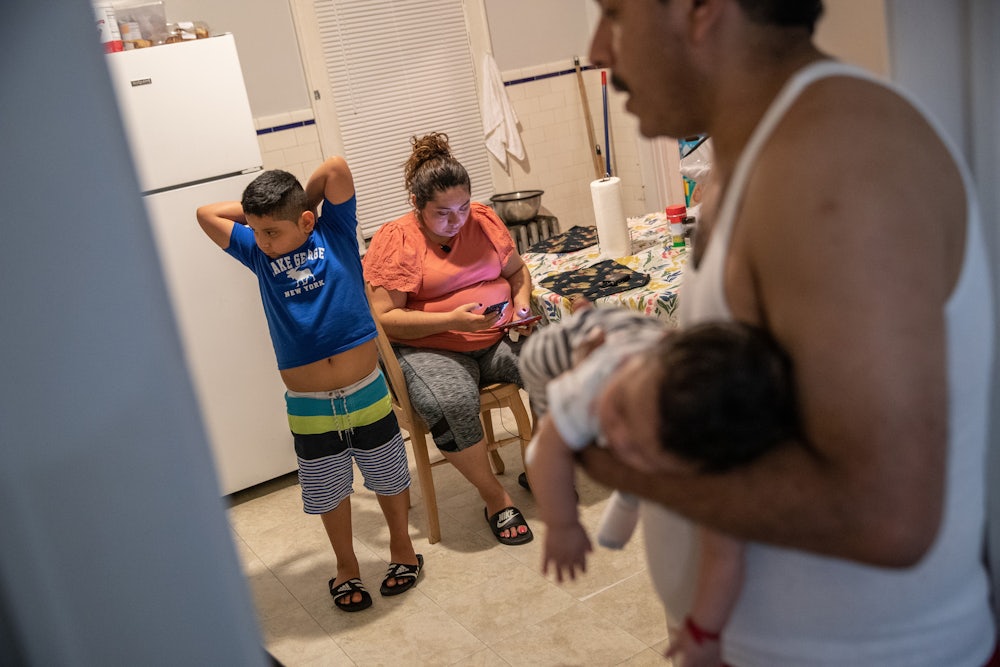Back in March, right as the World Health Organization declared the coronavirus a global pandemic, Joe Biden, now essentially the nation’s only choice for replacing Trump this fall, reaffirmed his opposition to a single-payer health care system like Medicare for All. The problem with such a system, he said, was its cost. “I want to know, how did they find $35 trillion?” he asked of a hypothetical Medicare for All bill. “What is that doing? Is it going to significantly raise taxes on the middle class, which it will? What’s going to happen?” Universal health care, in other words, was an unfeasible imposition on the national budget.
Yet the uneasy reality is that capitalism constantly asks people with far less than the federal government to perform their own impossible kind of budgeting—of both material resources and time—and as the pandemic rolls on through the summer, the number of families experiencing this wall of impossibility has only grown. Even once-comfortable parents worn thin from the strain of having to balance childcare and work—either remotely, or outside the home and potentially in harm’s way if they’re deemed “essential”—have sent out increasingly panicked calls for help. In a recent and widely shared New York Times article, the food writer Deb Perelman described the crushing strain of perpetual double duty and the absurdity of states reopening workplaces before schools and without any guarantee of childcare. “In the Covid-19 economy, you’re allowed only a kid or a job,” she wrote. “Why isn’t anyone talking about this? Why are we not hearing a primal scream so deafening that no plodding policy can be implemented without addressing the people buried by it?”
As many pointed out in response to the piece, this isn’t a new bind. Just as low-wage workers of color felt the effects of the pandemic first and sharpest, they’ve also been asked, over and over, to do the impossible for decades while the more fortunate—and most crucially, the government—simply looked away. In 2015, the Economic Policy Institute demonstrated that childcare was essentially unaffordable for a parent making minimum wage in the United States. The cost of childcare in every state was at least 30 percent of a minimum wage worker’s salary and more than 80 percent in states like New York. In Washington, D.C., the cost of childcare even exceeded the annual earnings of a minimum wage worker. Being allowed only a kid or a job, then, was more or less the norm for millions of parents making minimum wage even in the pre-Covid economy. As Perelman wrote, the ugly refrain of “You shouldn’t have had kids if you can’t take care of them” is now used to dismiss middle-class parents’ Covid struggles. That exact sentiment was also historically wielded at poor parents—particularly mothers, and particularly Black mothers—in order to refuse them any help whatsoever. “It began to really eat away at me that in the ’60s the federal government, desiring to help poor moms who were dealing with deadbeat dads that weren’t helping, decided, ‘We’ll help, we’ll give a check for every child you can have out of wedlock,’” Texas Representative Louie Gohmert said in 2014, on the fiftieth anniversary of the “war on poverty.”
Many more workers are now also feeling the squeeze when it comes to health care, which, in a pandemic, is both more necessary than ever and suddenly out of reach. According to a Kaiser Family Foundation study, mass unemployment in a country where most people’s access to health care depends on an employer means that an estimated 27 million people in the U.S. have lost their health insurance since March. And of that group, a number now find themselves caught between making exorbitant COBRA payments, just as their income has been cut off, or going uninsured during a global health crisis. This is a particularly harrowing set of circumstances as we learn more about the complexity of Covid’s health impacts. “The system is not set up to really help people,” one Texas resident told Bloomberg after failing to qualify for either Medicaid or Affordable Care Act subsidies after being laid off from her job. As it happens, 27 million is also approximately the number of people who were uninsured before Covid, which is to say that over 8 percent of the population were forced to gamble their health against their financial solvency—rationing insulin, for instance—during the longest-running bull market in the country’s history.
And perhaps the most fundamental nonchoice capitalism forces upon us is work itself. In the pandemic, that has meant a rush to reopen states prematurely, then punishing workers who refuse to return to their jobs in order to follow public health guidelines. In June, states like Oklahoma and Ohio (where Covid cases are now increasing) set up systems for bosses to report employees who refused to report back to work: Those workers were then disqualified from receiving continued unemployment benefits. As employment lawyer Rachel Bussett put it, “Their choices are: ‘Do I go back and risk my life, or say no and risk being kicked off unemployment and not be able to pay my bills?’” But if that seems like an especially cruel innovation in anti-worker policies, it’s also just the latest expression of what the labor journalist Josh Eidelson has called the fleecing of the American worker.
This is clearly unsustainable—has long been unsustainable. The only difference now is that the Covid economy has put a new and expanding group of people in the impossible position of picking one of several bad options, then punished them for making the wrong choice. But these have always been the options under capitalism. It’s just becoming harder for more to look away.
